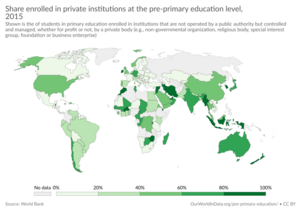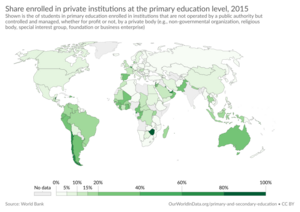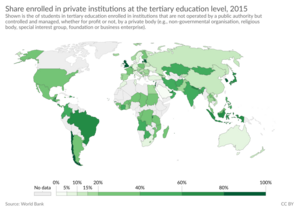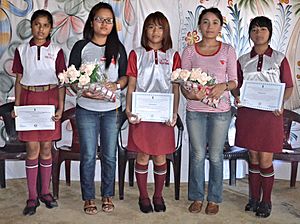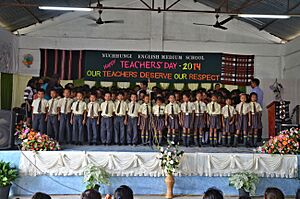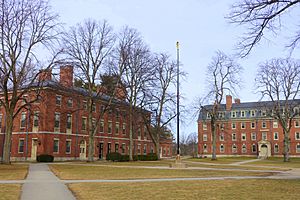Private school facts for kids
A private school or independent school is a type of school that is not run or paid for by the government. Unlike public schools, private schools get their money from other sources, like fees paid by students or donations. They usually have their own board of governors that helps them operate independently.
Private schools can choose which students they accept. They are mainly funded by charging students for tuition. However, some students might get a scholarship to help pay these fees. Scholarships can be given for talents (like sports or art), academic ability, or if a family needs financial help. For a long time, about one in ten families in the U.S. have chosen private schools for their children.
Some private schools are connected to a specific religious denomination or religion, such as Catholicism, Protestantism, or Judaism. Even if a private school has a religious link, it's still considered "private" if it doesn't rely on outside religious groups for its money or control. This applies to both elementary and high schools.
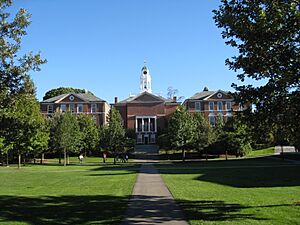
Different Kinds of Private Schools
Private schools come in many forms, offering different types of education.
School Levels and Fees
In countries like the United Kingdom, Australia, Canada, and New Zealand, the term "private school" usually refers to elementary and high schools. In North America, it can include everything from pre-school to universities. The yearly fees for K-12 (kindergarten through 12th grade) private schools can vary greatly. Some schools are "tuition-free," while others, especially in places like New England, can cost over $45,000 per year.
High school level private schools include those that prepare students for college (university-preparatory schools), boarding schools (where students live at the school), and day schools (where students go home each day). Tuition fees depend on the school's location, its financial resources, and what parents are willing to pay. Many military academies are also privately owned or operated.
Religious Schools
Many private schools are connected to a religion. These schools might teach religious education along with regular subjects to share their faith's beliefs and traditions. Other religious schools use their denomination as a general guide but keep academics and religion separate. Parochial schools, for example, are often Roman Catholic schools. Other religious groups with private schools include Protestants, Jews, Muslims, and Orthodox Christians.
Specialized and Alternative Schools
Some private schools offer alternative education or are online schools. Private schools often have more freedom from state rules, but most still follow guidelines for what they teach to ensure good quality education. Religious private schools often add religious lessons to the subjects taught in public schools.
Special assistance schools focus on helping students with specific needs. This can include schools for tutoring or schools designed for children with learning disabilities.
Private Schools Around the World
Private education systems differ from country to country. Here's a look at some examples:
Australia
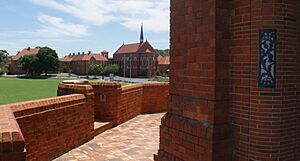
In Australia, private schools are usually run by an independent council. They offer a wide range of education and serve different communities. Most private schools are run by religious groups, but some have no religious connection. About 30% of elementary students and over 40% of high school students in Australia attend private schools, which is higher than the average for many other developed countries.
The Australian Government provides some funding to all schools, including private ones. This funding is based on a "School Resourcing Standard" which considers how well schools perform. Private schools also get money from tuition fees and donations. The oldest private school in Australia is The King’s School, founded in 1831. Catholic schools are a large part of the private school system and often have lower fees than other private schools.
Canada
In 1999, about 5.6% of Canadian students were in private schools. Some of these are religious schools, including Christian, Jewish, and Islamic schools. Canada also has some highly regarded private boarding schools.
Finland
Finland has state-run, municipality-run, and private schools. To get government funding, all schools must be approved by the Ministry of Education and follow national curriculum standards. While education is usually free, some private schools that teach in languages other than Finnish might charge small fees. There are also private schools that don't follow the national curriculum and don't get public money; their certificates are not officially recognized.
Germany
In Germany, the right to create private schools is protected by the country's basic law. This strong protection was put in place to ensure these schools can always operate independently.
India
In India, private schools are also called independent schools. Some receive financial help from the government (aided schools), while others do not (unaided schools). More and more families are choosing private schools, often because they want English-medium education or are not happy with public school quality. After a law called the Right to Education (RTE) Act was passed in 2009, private schools needed to be "government-recognized" by meeting certain conditions.
About 29% of students aged 6 to 14 in India attend private schools. While private schools exist, they are highly regulated by the government regarding what they can teach and how they operate.
Iran
There's been a lot of discussion in Iran about the difference in university entrance exam success between public and private school students. Private schools have grown by 15% and are becoming a big part of the education system. Some private schools can be quite expensive, costing a lot for a year of study.
Ireland
In Ireland, the term "private school" can be confusing. Most schools (about 85%) are privately owned, often by the Roman Catholic Church or other religious groups, but the Irish state pays for most of their costs, including teachers' salaries. Only a small number of these privately owned schools actually charge fees. These are called "fee-charging schools."
Fee-charging schools that receive state funding must follow state inspections and teach the national curriculum. There is one secondary school in Ireland that gets no state funding at all. It doesn't have to follow state supervision and its students take the International Baccalaureate instead of the Irish Leaving Certificate. However, its fees are much higher than other fee-charging schools. Many fee-charging schools in Ireland also offer boarding.
Malaysia
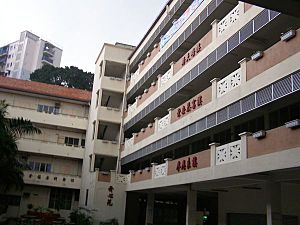
In Malaysia, Chinese independent high schools were started by the ethnic Chinese community in the 19th century. They offer high school education in the Chinese language, continuing from Chinese elementary schools. These schools mainly use Mandarin Chinese and simplified Chinese characters.
As private schools, they don't get regular funding from the Malaysian government, though they have received some support from state governments and in recent national budgets. Their fees are much lower than most other private schools because they aim to provide affordable education in Chinese. They mostly rely on donations from the public to keep going.
Netherlands
In the Netherlands, more than two-thirds of state-funded schools operate independently, and many are linked to religious groups. The education system in the Netherlands is highly rated internationally.
New Zealand
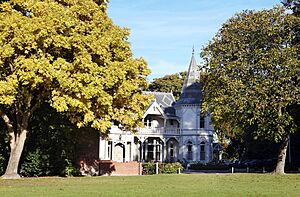
As of April 2014, New Zealand had 88 private schools, teaching about 28,000 students, which is about 3.7% of all students. The number of private schools has decreased since the 1970s because many chose to become "state-integrated schools." These schools keep their special character but receive state funds and operate like public schools, meaning they can't charge tuition fees (though they can charge "attendance dues" for building upkeep).
Private schools in New Zealand are mostly funded by tuition fees, but they do get some government help. They are popular for their strong academics, sports, and prestige. Many are connected to Anglican or Presbyterian churches.
Philippines
In the Philippines, private schools play a big role in providing education. They generally have the freedom to decide their own curriculum, following existing laws. Science high schools are special private schools for very bright students, focusing on problem-solving and critical thinking.
The Fund for Assistance to Private Education (FAPE) is a special fund created to help the private education sector in the Philippines.
Portugal
In Portugal, private schools were traditionally set up by people from other countries and diplomats to meet their educational needs. Portuguese-speaking private schools are common in major cities. International private schools are mostly found around Lisbon, Porto, and in the Algarve region. The Ministry of Education oversees all schools, including international ones.
Singapore
In Singapore, after the Primary School Leaving Examination (PSLE), students can choose to go to a private high school. Private tuition is very popular in Singapore, with many parents sending their children for extra lessons after school. Tuition centers charge high fees due to demand, making it a big industry. The government understands that parents want the best for their children and lets them decide whether to use tutors.
South Africa
Some of the oldest schools in South Africa are private church schools, started by missionaries in the early 1800s. The private education sector has grown a lot since then. After the end of apartheid, laws for private education changed. The South African Schools Act of 1996 recognizes "public" (state-controlled) and "independent" schools.
In the final years of apartheid, some white government schools became "semi-private" (called Model C schools) and started accepting students of all races. These schools often have better academic results than other public schools. While former "Model C" schools are state-controlled, they can charge higher fees than other public schools.
Sweden
In Sweden, students can freely choose a private school, and the private school receives the same amount of funding as public schools. In 2008, over 10% of Swedish students were in private schools. Sweden is known for its "school voucher" system, which allows students to choose their preferred school. For example, a large school chain called Kunskapsskolan ("The Knowledge School") has many schools and teaches nearly 10,000 students.
United Kingdom
In the UK, "private schools" are schools that are funded independently and are not part of the state system. They are also called independent schools. Within this group, "public schools" are a specific type of prestigious, often older, independent school. Private schools also include faith-based schools. Preparatory schools in England and Wales prepare students up to age 13 for public schools.
About 7% of children in the UK attend fee-charging schools at GCSE level (around age 16) and 13% at A-level (around age 18). Fees can range from under £3,000 to over £27,000 per year for boarding students. Many independent schools are single-sex, but this is becoming less common. Studies suggest that independent schools in Britain can help students achieve better educational results and get into top universities.
England and Wales
In England and Wales, the most famous independent schools are known as 'public schools'. Historically, 'public school' meant a school open to the public, not just private tutors. Many private schools compete with top state schools in academic achievements.
England has many old, world-famous institutions that inspired similar schools abroad. These include Winchester College, Eton College, St Paul's School, Harrow School, Westminster School, Charterhouse School, and Rugby School. The Independent Schools Inspectorate regularly checks the quality of education in all independent schools.
Scotland
In Scotland, schools not funded by the state are called independent or private schools. These can include specialist schools like music schools or special education schools.
Scottish independent schools teach over 31,000 students and employ about 3,500 teachers. They are inspected by the state inspectorate, Education Scotland. Independent schools in Scotland that are charities must show how they benefit the public.
United States
In the United States, a private school is any school whose buildings and funding do not come from the government. Most private schools in the U.S. are run by religious groups. The term "private school" often refers to non-religious schools, while "church school" or "parochial school" is used for religious ones.
Independent schools in the U.S. teach about 10% of all school-aged children. The main difference between independent schools and other private schools is that independent schools govern themselves and are financially independent. Unlike public schools (run by the government) or parochial schools (run by a church), independent schools have their own boards of trustees. They may be linked to a religion, but they are still self-governed.
Independent schools are not heavily controlled by the government, but they are checked by the same groups that approve public schools. The National Association of Independent Schools (NAIS) defines independent schools as non-profit organizations that "own themselves" and finance themselves through tuition, fundraising, and donations. This independence gives them the freedom to set their own missions, choose their students, define teacher qualifications, and decide what to teach.
In the 1800s, many Roman Catholic churches and religious groups started schools that operated without government funding. For many years, most private schools in the U.S. were Catholic schools.
After the 1954 court case Brown v. Board of Education of Topeka, which required schools to desegregate, many private "Christian academies" were formed, especially in the U.S. South. Many white students moved to these academies, while public schools became more focused on African-American students. These academies usually prepared students for college.
Private schools get their money from student tuition, donations, and sometimes from scholarship or school voucher programs. Government funding for religious schools can be limited due to laws about the separation of church and state. Non-religious private schools could get government funding, but they often prefer to keep their independence in choosing students and curriculum. Charter schools are a newer idea; they are public schools but operate somewhat like non-religious private schools.
The cost of quality private schools in the U.S. can be high. In 2023, tuition for some day schools in New York City was close to $60,000 per year, and for boarding schools, it was between $65,000 and $85,000. However, tuition alone might not cover all costs, especially for boarding schools. Leading schools often have large financial endowments and raise more money through donations. Top boarding schools attract students from all over the U.S. and other countries, and many more students apply than they can accept.
More Information
- Alternative school
- Freedom of education
- Right to education
- State school
- Voucher


